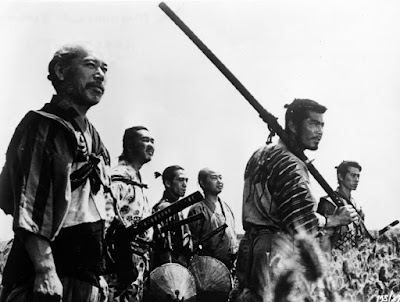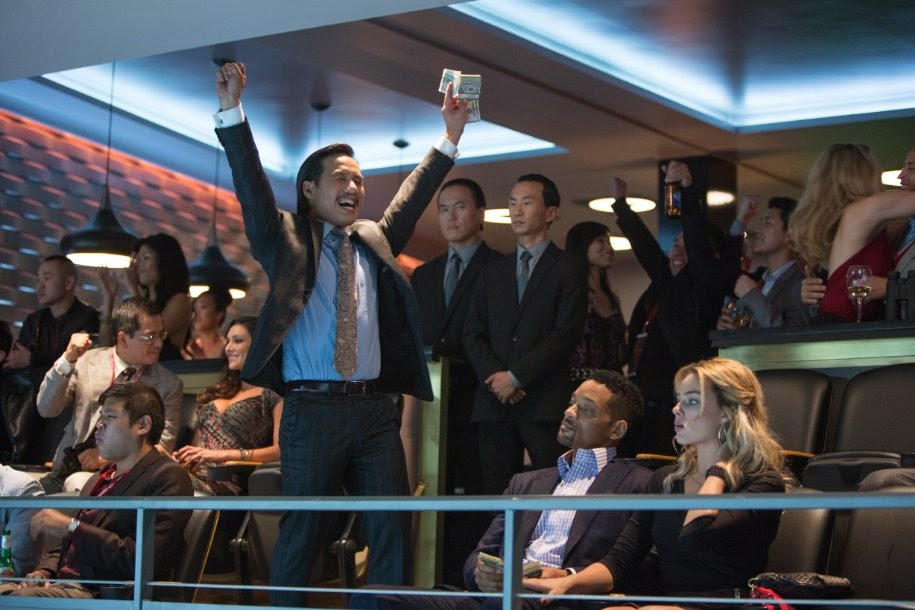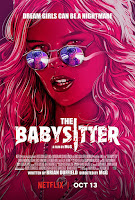Seven Samurai (Shichinin no samurai)
Seven Samurai (Shichinin no samurai)
(1954)
A Review by Grant Kanigan
Directed by: Akira Kurosawa
Written by: Akira Kurosawa, Shinobu Hashimoto,
& Hideo Oguni
Starring: Toshirô Mifune, Takashi Shimura
Rating: Not Rated
Release Date: April 9th, 1954
 |
| Takashi Shimura, Toshirô Mifune and the Seven Samurai prepare for battle in Seven Samurai Image Source |
With the epicentre of commercial cinema having lied within the borders of North America since it's inception, people tend to forget that cinema can also be a multilingual, multicultural form of art. Nowadays, people have access to more and more independent content throughout the world as globalized media enters the digital age. Brilliant foreign films like Wild Tales, The Hunt, Kon-Tiki, Monsieur Lazhar and Departures are all available, either through iTunes, Netflix or online ordering, through relatively cost-effective means. In some ways, this can lead to more garbage, straight to DVD/VOD trash polluting the online rental landscape, but conversely, leads to access of films that were largely inaccessible before. Films like Kurosawa's Seven Samurai, or the works of Truffaut and Godard who spawned the French New Wave of cinema were largely unavailable to cinephiles, especially with the closure of video rental establishments. Even when available through sources like Criterion, these oft forgotten classics cost an arm and a leg, (still, with their original artwork, extras and remastered film stock, Criterion releases are definitely worth their weight in celluloid). Nowadays, armed with a film textbook, or just a need to explore the greatest cinema in history, all a film lover has to do is put in time. One of the films that has stood the test of time, and has influenced countless storytellers since it's inception is Akira Kurosawa's Seven Samurai (Shichinin no samurai).
The importance of Kurosawa is essential to anyone interested in the roots of grand cinema; his films were constantly remade by western studios, (The Magnificent Seven, A Fistful of Dollars, The Outrage and Last Man Standing), and he influenced countless directors from George Lucas to Scorsese and pretty much every other brilliant director from the twentieth century. The Mirror quotes Francis Ford Coppola as saying: "one thing that distinguishes Akira Kurosawa [from other directors is], that he didn't make a masterpiece or two masterpieces, he made, you know, eight masterpieces." As someone just beginning to appreciate and explore Kurosawa, Seven Samurai seems to stand high atop those masterpieces.
Released in 1954, soon after two of his other masterworks, (Ikiru and Rashômon), Seven Samurai blends the existential, bleak, yet still inspirational philosophy of Ikiru, and the ferocious, devious and visceral intensity of Rashômon into a cool, collected mix of violence, sociology, and romance. Never before have I seen such a film that can blend complex philosophical and moral quandaries into taut cinematography enclosed within the threat of death.
The film follows a group of desperate villagers who discover that a large group of thieves plan to raid their village post-harvest, taking everything, and leaving nobody alive. It's near the year 1600 in Japan, and farmers are the lowest on the totem pole in the ancient Japanese caste system. Fearing death, hunger and the loss of their closest friends and family, four of the strongest villagers make the long trek to the nearest city in search of help. They have nothing to offer but rice and their pleas, making it a virtual impossibility that anyone will take the time to hear them.
After what seems like weeks of begging, the farmers catch the eye of an old Samurai, who agrees to help them after seeing how utterly hopeless their plight is. The old Samurai, Kambei Shimada, (Takashi Shimura), seems to take on their dire needs because it's simply the morally correct thing to do; his experiences surviving as a samurai seem to enforce this peculiar decision. Yet, after a whirlwind takedown of a thief-turned attempted child murderer, he's not the only one who is interested in the villagers' free-meal deal. With the help of an old friend impressed by Shimada's public defeat of a criminal, Shimada rounds up six other Samurai, and heads back to the villagers' homestead to prepare for battle.
What seems like a simple battle between good and evil, soon becomes a complex tale of social expectations, the emotional, physical and psychological costs of war, as well as the thankless nature and sacrifice of human life in armed conflict. Clocking in at a shocking three hours and twenty-seven minutes, not one minute is wasted. Whether it's exploring the nature of youth versus experience, love versus expectations, or sacrifice versus self preservation, Kurosawa is either engaging the cerebrum with his exploration of Japanese, (and by extension human), culture or wowing the visual cortex with his, (then), groundbreaking cinematography. From tracking shots on a blood soaked battlefield, to the movement of a mass of people by focusing on their feet, it's visually entertaining, inventive, and absolutely influential. Kurosawa wasn't just a master of cinematography - every element of Seven Samurai was groundbreaking for it's time, and is arguably flawless. The performances too, are legendary. Breaking onto the scene as a crazed man with insatiable bloodlust in Rashômon, Toshirô Mifune is brilliant as the torn Kikichiyo, a pseudo-samurai attempting to change identity within the caste system, and who only succeeds out of pure talent and unrelenting will. His constant change between ferocious, funny and heartbroken emotions are truly brilliant acting. Additionally, as the battle worn samurai Shimada, Takashi Shimura's performance is a far cry from his frail performance as the cancer stricken protagonist of Ikiru, released two years prior. Here, he is wise, methodical and brutally strong. It's an impressive shedding of skin that is rarely seen in cinema, and from what I've seen of his work so far, Shimura was one of the best of his generation.
I could go on for pages about the brilliant aspects and compelling minutia of Seven Samurai, but it is an experience meant to be seen on the biggest screen imaginable. To pick it to pieces seems somewhat antithetical to the intentions behind Kurosawa; his films, while deserving of close attention and exploration, also seem to lend themselves to the fluid, wayward nature of memory and the human condition. It's this nature that makes elements stand out; love is what keeps humanity alive; war is what tears us apart. There's a lot of important messages within Seven Samurai, but two seem to sum up the dissonant nature of humanity. Shimada states: "This is the nature of war. By protecting others, you save yourselves." Yet, after seeing the cost of such a war, looking on at the graves of his fellow Samurai while the saved villagers celebrate the death of the bandits and thieves, Shimada wonders: "So. Again we are defeated. The farmers have won. Not us."
GRANT'S RATING: 5/5 STARS
Criterion's Three Reasons: Seven Samurai



Comments